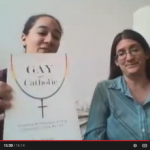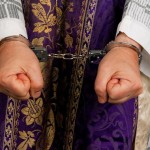
Mark Shea is in agreement with Rod Dreher that Obama and the Dems are mounting a serious assault on the religious liberty of military chaplains. Quoth Dreher (quoting the news first):
The Obama administration “strongly objects” to provisions in a House defense authorization bill that would prohibit the use of military property for same-sex “marriage or marriage-like” ceremonies, and protect military chaplains from negative repercussions for refusing to perform ceremonies that conflict with their beliefs, according to the Office of Management and Budget (OMB).
If this goes through, the Catholic and the Orthodox chaplains will have to be withdrawn from the US military. Many Evangelical chaplains will choose to leave. If same-sex marriage is constitutionalized by Supreme Court ruling, then I don’t see how even a legislative exemption would be possible. This is another one of the answers to the question, “How does my gay neighbor’s marriage to his partner affect me?”
There are two parts of this defense authorization bill rider, and I want to address them separately. (Well, there are three parts, if you want to pause with me and think about how you would object to sticking regulations of chaplaincy into a must-pass defense bill, if it weren’t for the fact that you are still angry that we have must-pass defense bills for our wars of choice, drone campaigns, and gargantuan military-industrial complex, and that this isn’t the correct reason to have qualms about the bill.) [/end tangent]
What is the rider meant to do? First, it bans the use of military property for same-sex weddings in states where they’re legal and same-sex “commitment ceremonies”/”handfastings”/whatnot in states where same-sex civil marriage is illegal, but some religions still want to recognize and solemnize these relationships. Banning clergy from carrying out these ceremonies is a restriction on religious freedom. Plenty of churches, synagogues, etc do allow same-sex weddings, and this bill would prohibit chaplains in those faiths from performing marriages that their tradition and the state recognizes as valid.
The only justification for this part of the bill is a desire to put up impediments to gay weddings. And there’s no reason why a wedding performed on a base by a liberal chaplain should cause an Orthodox, Catholic, or conservative evangelical chaplain to resign. After all, they already may share space with clergy conducting marriages that are non-sacramental (two atheists) or non-valid (a lapsed Catholic divorcee) in the eyes of their faith.

The second issue, the conscience objection, is a little more complicated. I’m not sure exactly what it’s meant to protect chaplains from. Currently, no one can force a Catholic chaplain to conduct weddings that are invalid or non-sacramental according to the Church. I don’t see why there would need to be a special piece of legislation enumerating marriages that some churches don’t see as valid (and having the state make such a list seems like asking for trouble). If the rider is meant to recognize the fact that no one can compel the clergy to marry same-sex couples, I don’t object, but it seems awfully superfluous.
My liberal posse and I have no problem with conscience objections for religious ceremonies. We just get a little nervous when the conscience clause gets expanded to include spiritual counseling. In the military, a soldier’s counselling options are limited, so gay soldiers may want to talk to chaplains that don’t share their moral beliefs or even their underlying faith. (I don’t think there are a lot of reconstructionist Jews serving as chaplains). The concern folks on my team tend to have is that a chaplain might refuse to counsel a gay soldier or would harass them under the cover of religious freedom.
This is a delicate problem on both sides, but not a totally new one, since weird chaplaincy-soldier matchups already occur. My side just wants to make it less likely that a gay Christian soldier who wants to talk to the conservative evangelical chaplain in her unit about expanding her prayer life isn’t going to get harangued as an abomination. (Which seems like bad tactics for the chaplain in the first place).
I’m not sure exactly how this should work out in practice, any more than I know how exactly an evangelical chaplain who sees Rome as the Whore of Babylon should talk to a Catholic soldier who is doubting his faith. It’s unreasonable to ask the chaplain to pretend to be non-denominational, but the chaplaincy is supposed to offer some kind of safety and security to soldiers. It’s a ticklish business, and I don’t expect that riders positioned as photo-ops for the culture war are going to help anyone sort it out.
And that’s the limit of my radical homosexual agenda. In this arena, anyway.











